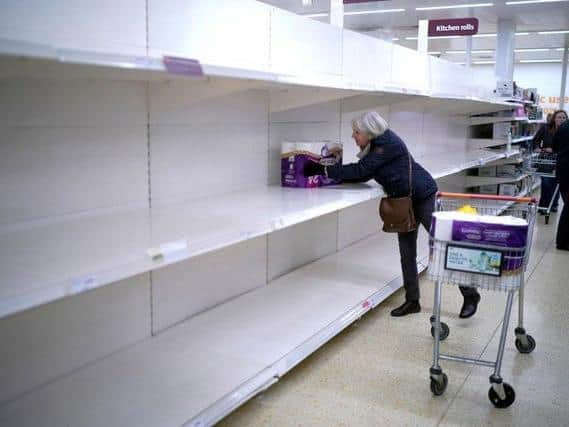How long restrictions are expected to last as UK tightens measures against coronavirus
and live on Freeview channel 276
The disruption to our daily lives has caused a lot of worry and anxiety - but when will these measures end?
As of Friday afternoon, no one really knows when the coronavirus pandemic will come to an end.
Advertisement
Hide AdAdvertisement
Hide AdPrime Minister Boris Johnson said in his speech on Thursday that he believes the country can "send coronavirus packing" in 12 weeks.


However, scientists issued advice to the government today suggesting that social isolation measures will need to be in place for most of a year at least.
Scientists also advised ministers that, while the severity of measures could alternate during the period, the "stricter" measures would need to be enforced for at least half of the year.
A report by the scientific pandemic influenza group on modelling states: "It was agreed that the addition of both general social distancing and school closures to case isolation, household isolation and social distancing of vulnerable groups would be likely to control the epidemic when kept in place for a long period.
Advertisement
Hide AdAdvertisement
Hide Ad"It was agreed that a policy of alternating between periods of more and less strict social distancing measures could plausibly be effective at keeping the number of critical care cases within capacity.
"These would need to be in place for at least most of a year. Under such as policy, at least half of the year would be spent under the stricter social distancing measures."
How will coronavirus end?
Coronavirus will be downgraded from a pandemic once it no longer matches the specifications put in place by the World Health Organisation.
Currently, a pandemic is described as having increased and sustained transmission throughout the general populous, across one or more continents.
Advertisement
Hide AdAdvertisement
Hide AdOnce new instances of coronavirus start to decrease, and the number of affected areas begins to lower, it will likely see this downgrade.
It could still be some time after that until the disease is brought completely under control worldwide though, and areas with less developed health systems could still struggle with the virus for years to come.
Coronavirus: the facts
What is coronavirus?
COVID-19 is a respiratory illness that can affect lungs and airways. It is caused by a virus called coronavirus.
What caused coronavirus?
The outbreak started in Wuhan in China in December 2019 and it is thought that the virus, like others of its kind, has come from animals.
How is it spread?
Advertisement
Hide AdAdvertisement
Hide AdAs this is such a new illness, experts still aren’t sure how it is spread.
But similar viruses are spread in cough droplets.
Therefore covering your nose and mouth when sneezing and coughing, and disposing of used tissues straight away is advised.
Viruses like coronavirus cannot live outside the body for very long.
What are the symptoms?
The NHS states that the symptoms are: a dry cough, high temperature and shortness of breath - but these symptoms do not necessarily mean you have the illness.
Advertisement
Hide AdAdvertisement
Hide AdLook out for flu-like symptoms, such as aches and pains, nasal congestion, runny nose and a sore throat.
It’s important to remember that some people may become infected but won’t develop any symptoms or feel unwell.
What precautions can be taken?
Washing your hands with soap and water thoroughly.
The NHS also advises to cover your mouth and nose with a tissue or your sleeve (not your hands) when you cough or sneeze; put used tissues in the bin immediately and try to avoid close contact with people who are unwell.
Also avoiding touching eyes, nose and mouth unless your hands are clean.
Government advice
Advertisement
Hide AdAdvertisement
Hide AdAs of Monday 16 March the government advised that everyone should be observing social distancing - avoiding unnecessary travel and working from home where possible.
Anyone with a cough or cold symptoms now needs to self-isolate with their entire household for 14 days.
The government has also advised against going to the pub, out for dinner or partaking in any socialising with large groups.
This has caused a number of closures across the country. Schools will close from Friday 20 March for the foreseeable future and exams have been cancelled.
Advertisement
Hide AdAdvertisement
Hide AdThe over 70s or anyone who is vulnerable or living with an underlying illness are being asked to be extra careful and stay at home to self-isolate.
For more information on government advice, please check their website
Should I avoid public places?
The advice now is to avoid public places and any non-essential travel.
Travel abroad is also being advised against for the next 30 days at least, and many European countries have closed their borders.
What should I do if I feel unwell?
Advertisement
Hide AdAdvertisement
Hide AdDon’t go to your GP but instead look online at the coronavirus service that can tell you if you need medical help and what to do next.
When to call NHS 111
NHS 111 should be used if you feel unwell with coronavirus symptoms, have been in a country with a high risk of coronavirus in the last 14 days or if you have been in close contact with someone with the virus.
Sources: World Health Organisation and NHS